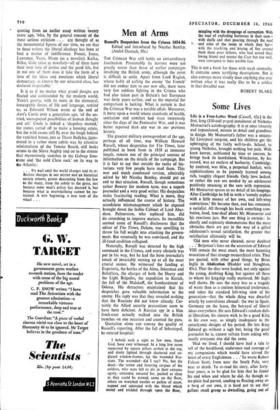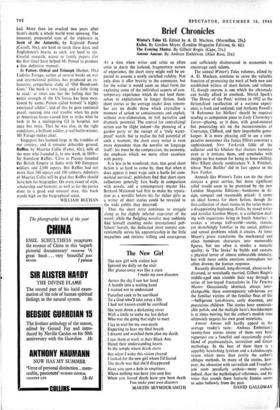Some Lives
Life is a Four-Letter Word (Cassell, 42s.) is the first, long (530-odd pages) instalment of Nicholas Monsarrat's autobiography. It is at once leisurely and impassioned, minute in detail and grandiose in design. Mr Monsarrat's father was a success-
ful Liverpool surgeon, and his children got the upbringing of the fairly well-to-do. School, to young Nicholas, brought nothing but pain, With keen horror, unblunted by time or success, he brings back its hatefulness. Winchester, by his record, was an enclave of barbarity. Cambridge, by contrast, was bliss, a perpetual funfair, with sophistications to be joyously learned among rich, toughly elegant friends. Only love lacked; or rather the raw sex needed by an adolescent positively steaming at the ears with repression.
Mr Monsarrat spares us no detail of his longings.
After Cambridge be fell in with a 'comely orphan with a little money of her own, and left-wing convictions.' He became then, and has remained, a socialist. All through his book something com- bative, loud, tone-deaf about Mr Monsarrat and
his reactions jars. But one thing is certain: he clearly and copiously demonstrates that the more obstacles there are put in the way of a gifted adolescent's sexual satisfaction, the greater that satisfaction ultimately will be.
`Old men who never cheated, never doubted . . Betjeman's lines on the accession of Edward VIII remain the most exact, the most haunting evocation of that strange monarchical crisis. They are quoted, with other good things, by Brian Inglis in Abdication (Hodder and Stoughton, 45s.). That the dice were loaded, not only against the young, doubting King, but against all those to whom his kingship really mattered, Mr Inglis well shows. He sees the story less as a tragedy of waste than as a curious historical irrelevance, and takes the standard left-wing view of his generation—that the whole thing was dwarfed utterly by convulsions abroad: the war in Spain, Germany on the loose, the betrayal of liberal ideas everywhere. He sees Edward's random dabs at liberalism, his sincere wish to be a good King
in his own way, as simply inadequate to the cataclysmic designs of his period. He lets King Edward go without a sigh but, being the good journalist he is, cannot refrain from asking why nearly everyone else did the same.
`Had we lived, I should have had a tale to tell of the hardihood, endurance and courage of
my companions which would have stirred the heart of every Englishman . . .' So wrote Robert Falcon Scott, from near the South Pole, very near to death. To re-read his story, after forty- four years, is to be glad for him that he found his end when and where he did. As though an ice-plain had parted, sending us floating away on a berg of our own, it is hard not to see that gallant small group as dwindling, going out of hail. More than ice cracked two years after Scott's death; a whole world went spinning. The innocent, purposeful eyes of the explorers in Scott of the Antarctic, by Reginald Pound (Cassell, 36s.), are hard to catch these days, and Englishmen's hearts, as such, are hard to stir. Careful research, access to family papers (for the first time) have helped Mr Pound to produce a fine definitive memoir.
In Patton: Ordeal and Triumph (Barker, 55s.) Ladislas Farago, author of several books on war and international politics, has produced an ex- haustive, sympathetic study of 'Old Blood-and- Guts.' The book is very long, and a little tiring to read : at times one has the feeling that the entire strength of the US forces has been men- tioned by name. Patton called himself 'a highly emotional soldier'; and of this he gave continual proof, running into real trouble when his pain at American losses caused him to strike what he took to be a malingering GI in hospital, not once but twice. That he was also, in the right .conditions, a brilliant soldier, a real battle-winner, Mr Farago makes clear.
Singapore has loomed large in the troubles of our century, and it remains debatable ground. Raffles, by Maurice Collis (Faber, 42s.), tells of the man who founded it, in one week, in 1819— Sir Stamford Raffles. 'Clive at Plassey founded the British Empire in India with 900 European soldiers and 2,100 sepoys. But Raffles had not more than 340 sepoys and 100 soldiers. Admirers of Maurice Collis will be glad that Raffles should have him for biographer. On every count of style, scholarship and humour, as well as for the justice done to a good and unusual man, this book stands high on the biographical scene.
WILLIAM BUCHAN































 Previous page
Previous page